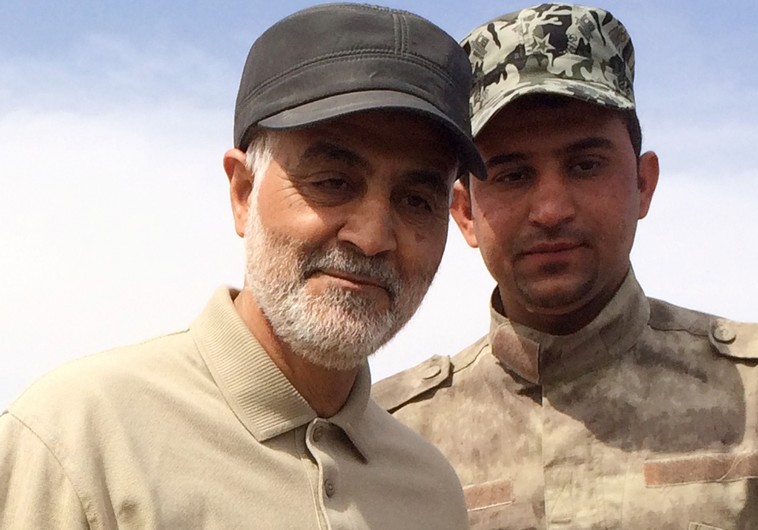Qassem Soleimani’s tactical ideologies exposed
Majid Rafizadeh/Al Arabiya
Friday, 30 May 2015
Qassem Soleimani, Iranian military leader, ideologue, and commander in chief of the Quds force- a branch of the Islamic Republic’s Revolutionary Guard Corps that conducts extraterritorial military and clandestine operations- has been coming out of his shell and becoming more vocal in stating his opinions. Earlier this week, the general criticized the U.S. for its failure to confront ISIS and boasted about Iran’s stance in combating extremism in the region. The Tasnim news agency quoted Soleimani as saying: “Today, in the fight against this dangerous phenomenon, nobody is present except Iran.”
His latest statements reflect the long-standing intention of the Quds Force and General Soleimani, to justify Iranian military presence in other countries as well as to spread the revolutionary ideology of the Islamic Republic through projecting Iran as the savior of the Muslim world, and the mostazafan (meaning the oppressed).
Military and ideological shift: From soft power to hard power
Nevertheless, it is crucial to point out that there has been a tactical and strategic shift in Soleimani and other Iranian military leaders’ operations recently. While the Islamic Republic used to wield power through its ideology, after the election of pragmatist Hassan Rowhani and after the nuclear negotiations initiated in 2013, the Islamic Republic’s military leaders began the reversal course of spreading their ideology through power. In other words, in the past, Iran utilized its revolutionary principles to gain popularity in the region, by relying on soft power to gain influence in other countries in the Middle East.
General Soleimani and other Iranian military leaders have created a vicious circle in the region. However, in the last few years, Iran has shifted to increasingly deploying its power (mainly military) to spread its ideology. It has shifted to deploying hard power. This phenomenon is new, concerning political and ideological calculations of Iranian leaders. And General Soleimani is a major figure in fulfilling this agenda through extraterritorial and clandestine military operations, as well as through reportedly supporting, arming, and financing Shiite extremist groups.
Iran’s tactical and strategic military shift – to spread its revolutionary principles and ideologies through military and hard power rather than soft power – is a main reason behind the decreasing popularity and increasing resentment towards the Islamic Republic from average members of public in the region. While Iran used to bear some popularity among them, Tehran’s direct military influence and intervention in Iraq, Yemen, Lebanon, and Syria has significantly changed the image of Iran in the region.
It is crucial to point out that Soleimani and Iranian military leaders’ reliance on hard power led to unintended consequences, having a direct link to the creation of groups such as ISIS, as well as to fueling extremism in the region. One can make the argument that Iran’s support for President Bashar al-Assad, who continues to commit atrocities and crimes against humanity in Syria, is the major reason behind the increasing influence of ISIS and other extremist groups.
Justifying Iran’s increasing military influence
In order to vindicate Iran’s increasing military influence, the general stated that the Islamic Republic should assist nations, which are suffering from the actions of ISIS. He added, “We should immunize our borders against this great evil and we should help those countries that are suffering under Daesh,” the Arabic acronym used as an alternative name for ISIS.
In the past few weeks, ISIS fighters have been capable of capturing crucial cities in Iraq and Syria. While lashing out at other forces for not fighting ISIS well enough, Soleimani diverted attention from Iran’s role of increasing military interventions, and he did not point to Iran’s strategic, military, and tactical methods which have indeed played a crucial role in fueling extremism in the region. He stated “How is it that America claims to be protecting the Iraqi government, when a few kilometers away in Ramadi, killings and war crimes are taking place and they are doing nothing?” He added, “Obama has not done a damn thing so far to confront Daesh: doesn’t that show that there is no will in America to confront it?”
But General Soleimani’s recent statements are aimed at justifying the Islamic Republic’s increasing on-the-ground military presence in other Arab nations including Iraq, Syria, Yemen and Lebanon.
While the Iranian military continues to control upper security and military ranks in Iraq and Syria, and reportedly send armament to the Shiite militia groups including the Houthis and Badr, regional security and geopolitical concerns regarding Iran’s increasing military influence and infiltration in Arab countries have ratcheted up and created more tension and conflict in the Middle East. The latest’s statements by General Soleimani were intended to avert such criticisms.
Soleimani’s underlying strategies and military tactics in operating in foreign countries, have been driven by influencing the socio-political and socio-economic process of other Arab countries through the Quds Force support and assistance in establishing Shiite militia groups in several countries.
Soleimani does not solely seek to take military control or increase the influence of the Iranian leaders in other Arab countries. His other fundamental objective has been to spread the revolutionary ideologies of the Islamic Republic and the office of the Supreme Leader, Ayatollah Ali Khamenei, through military interventions. From his perspective, these ideological objectives can be best achieved by making alliances and strengthening Shiite militia groups across the region.
General Soleimani and other Iranian military leaders have created a vicious circle in the region; the more Iran utilizes Shiite militia groups and the more Iran deploys its military in other nations, the more it fuels extremism and the creation of militia groups which in return would fight against Iran and destabilize the region. This vicious circle can lead to a major conflagration in the region.


















